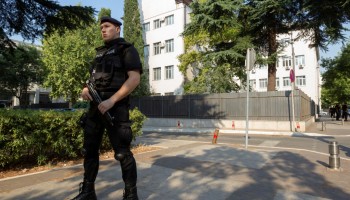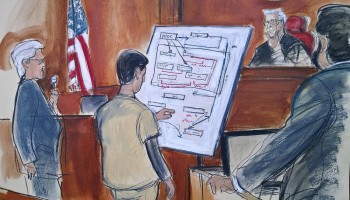In a major investigation last month the Organized Crime and Corruption Reporting Project (OCCRP) and BBC Nightnews disclosed how banking laws and regulations and the Central Bank were brazenly ignored by First Bank which is controlled by the family of former Prime Minister and leading party President Milo Djukanovic.
Montenegro citizens and groups are allowed to file criminal charges that prosecutors are then required to investigate and respond to.
The first report MANS submitted covered a period when Djukanovic was prime minister, Igor Luksic was minister of Finances, and Radoje Zugic was a president board member at First Bank..
In 2008 Zugic asked Luksic to approve an emergency €44 million (US$55 million) loan from the state budget under a new protection of banking law that has been passed earlier that year. Luksic approved this loan even though he knew that First Bank did not have the capital to repay and that the loan would not solve the bank’s problems.
The bank also did not have a plan as required for emergency loans to fix its problem and spent the money without required approval by the Central Bank.
When Luksic asked for an assessment of First Bank in March 2009, it was clear the emergency loan had not helped. First Bank had by then accumulated €75 million (US$94 million) in debt. The Central Bank estimated that the bank was acquiring debt at a rate of half a million Euros per day.
Instead of canceling the contract on the loan, which would have meant the state taking over the bank, Luksic amended it so that First Bank was required to repay €11 million (US$13.8 million). Repayment of the remaining €33 million (US$41.5 million) was postponed, MANS has accused.
On March 13, 2009, Luksic transferred €1 million (US$1.25 million) from the state treasury to the First Bank. First Bank immediately transferred that back to the state account as a repayment. Luksic repeated these transactions 11 times in less than 30 minutes, making it seem as if First Bank had repaid €11 million of its debt.
The Central Bank found out that First Bank had insufficient funds when it was supposed to be repaying its loan. However, this money came from the state budget, and it was funneled into state companies that had accounts with the First Bank.
In September 2009 Djukanovic and Luksic used their influence, according to MANS, to pour €192.2 million (US$241 million) from the sale of state stocks into First Bank.
Thus, the First Bank never repaid a single cent of its debt to the state, MANS said.
The non-profit also faulted the two politicians for failing to comply with World Bank and IMF requirements to remove state funds from First Bank as a condition for a loan. Instead, the government deposited more state funds into First Bank and borrowed from commercial banks at higher interest rates, a cost taxpayers covered.
MANS’ second report to Ivanovic levels charges against Zugic, two members of Parliament, a former CEO of First Bank and the bank itself. The agency faulted them for actions including changing bank laws and firing Central Bank administrators, as a way to insure that the Central Bank could not properly supervise or take measures against First Bank. Mans faulted them too for failure to report illegalities they knew about, as is legally required of public officials.
The CEO named was Predrag Drecun and the MPs were Alexsandar Damjanovic and Zarija Franovic.
Since the media reports on the First Bank came out, MANS charged, Zugic and others have taken actions designed to prevent a thorough investigation, to keep anyone from talking about information they might have and to track down and punish people who might have supplied information to journalists.





